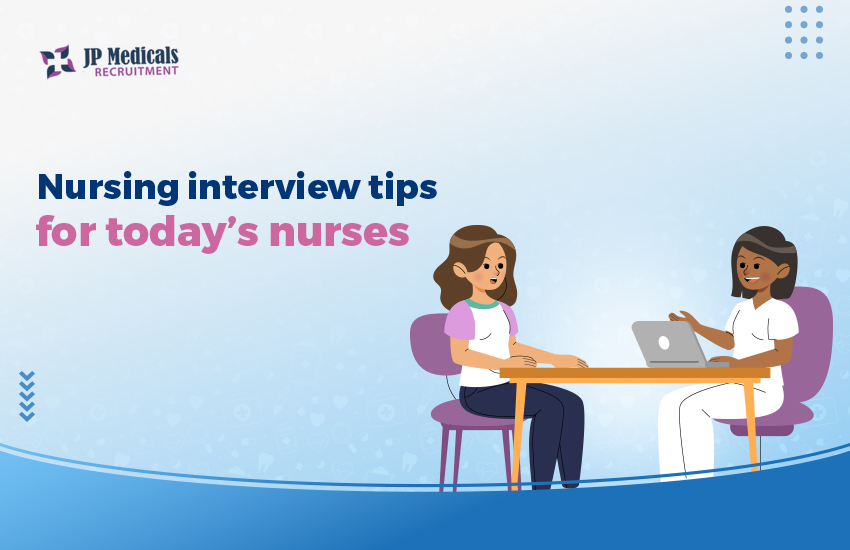If you are looking for Nursing interview tips, then you are at the right place.
Being a nurse is a most demanding and fulfilling career. But the very thought of an interview brings oversized butterflies to your stomach. Skilled nurses are always in demand in the UK and the increase in the number of registered nurses is the right proof. Therefore if you are getting ready for one of the specialty nurses categories, then it’s crucial that you are prepared to distinguish yourself from the lot. But how do you do it? With years of expertise in nursing staffing, the team of JP Medicals Recruitment has outlined nursing interview tips that can help you with the job you want.
Nursing interview tips from real recruiters
Most nursing interview tips may seem obvious, but there are several others that need to be kept in mind. Ultimately, you wouldn’t want to miss out on a job just because you made an mendable blunder.
♦ Be on schedule. This simply means you are not too early or too late, but showing up when you are called there. Reserve some extra time for the parking. Getting this basic right can help you stand out from the crowd of other qualified professionals, who are equally qualified as you.
♦ Do not forget the basic interview etiquette like a firm handshake, eye contact, and turning off your phone.
♦ You might have a good GPA, graduated from one of the best nursing colleges, with a good amount of experience as an intern, nursing assistant, or a volunteer, but if you aren’t outspoken about who and what you are, then you are missing your chance of getting shortlisted for your dream job.
♦ Carry your portfolio or your resume in a binder. Your resume should be neat and clear with details of your history, education, accomplishments, your participation in events, patient experience, etc.
♦ Don’t fail to collate your letters of appreciation from your current employer, patients, exemplary contributions in volunteer activities or events to catch the eye.
♦Your strength lies in convincing your recruiter of how his healthcare organization couldn’t live without you being in — display your skill set, goals, vision, confidence, and not arrogance. Prove to the recruiter that you could be a valuable team member by maintaining eye contact and speaking spontaneously.
♦ Be in pace with the interviewer. If your interview is enthusiastic, he will expect the same from you. Relate yourself well with his personality and answer his questions. If he is enthusiastic and wants to know more about you, reflect the same vitality. On the other hand, if your interviewer is demure and is playing slow, your overselling may work against you.
♦ The success of your interview has a lot to do with your personality. Recruiters look for candidates who are more personable and charming. Display those details in your interview.
♦ Dress up conservatively, but simple. An interview time is definitely not a time for a bare midriff, distressed jeans, or flip-flops. Accessorize yourself with a scarf or a tie for a conservative look that shows how serious you are.
♦ Employers look for two main things from you – your intelligence and attitude. Prepare meaningful responses for the questions fired that will help your employer rightly assess you.
♦ This is the right place to prove your knowledge-based skills (training and technical abilities, computer skills, etc), transferable skills (problem-solving, organization, and communication style), and personal traits (team player, trustworthy, hardworking, patience level).
♦ Delivering intelligence in the patient experience can add weightage to your profile.
♦ Your offer doesn’t come straight away after convincing your employer. He may further verify you by looking into your presence in social media by logging into LinkedIn, Instagram, Facebook, Twitter. Therefore your content there has to be appealing enough for the prospective employer to view.
♦ In the case of a peer interview, you would be expected to prove that you will fit their team well. The best strategy here is to be prepared with real-life experiences about specific clinical settings and throw light on how you handled each case proactively.
♦ You should also be aware that your recruiter is not always a nurse, rather an outsourced agency too. You need to play your best.
♦ Make sure you rule out all ambiguity about the further steps. For instance, about whom to contact and when to for clarity and processes.
♦ Post interview, do not forget to share a personal thank you note to the employer that same day.
Being a nurse is itself a great opportunity. Take the best look at your excellent self and move forward with confidence. Just trust that an interview that you land is itself a success because not everyone gets it. If you are NHS registered nurse, contact JP Medicals Recruitment for an exceptional service now!





